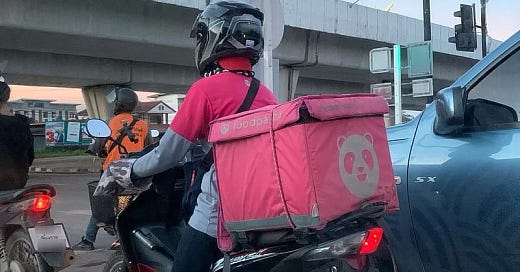Panda Politics and the Thai Home Food Delivery Industry
Creative destruction runs wild in the food business
Motorcycle food deliveries have mushroomed across Thailand since the beginning of the Covid-19 pandemic, a cutthroat business with a half-dozen companies fighting for market share on the backs of 60-80,000 riders across the country who weave in and out of horrendous traffic at breakneck speeds for up to 14 hours a day, and with none of the companies making any money.
According to Statista, the Thai market was worth US$280 million in July last year and has grown steadily over the past 12 months as Covid-19 has kept restaurant patrons at home. This emerging industry is dominated by Southeast Asian regional companies including Grab with 50 percent of the market, Foodpanda at 23 percent, LineMan at 20 percent, and Gojek at 7 percent.
Despite the lack of profit, these foreign-owned ventures are planning IPOs to cash in while the market is hot. Grabfood plans a Nasdaq listing later this year, expected to be valued at US$40 billion. LineMan is planning to merge with Z Holdings Corporation, the owner of Yahoo Japan. Gojek is also planning a merger within the tech industry to Tokopedia to form the GoTo Group.
Speed appears to be important in these moves, as a UK firm utilizing the same business model had what the Financial Times described as “the worst IPO in London’s history” with shares falling more than 25 percent on the first day of trading. Although Foodpanda’s revenue grew more than twofold over the last 12 months, the company is yet to achieve profitability.
In addition, new business models are being launched onto the market. Siam Commercial Bank’s new platform charges no commission to restaurants, investing more than US $35 million into the app, called Robinhood, which has more than a million downloads to date. It is reported that more than 93,000 restaurants have signed up, making more than 20,000 transactions daily.
As an example of the volatility of the industry, Foodpanda is now facing a consumer boycott after it tweeted official criticism of a rider allegedly setting fire to the portrait of the controversial king Maha Vajiralongkorn at a demonstration. “We’re rushing to severely deal with him under company policy. He will be fired immediately,” the company tweeted. “Please note that Foodpanda has a policy against violence and all types of terrorisms and will be happy to assist officers in prosecuting the offender.”
That led to the formation of the hashtag #banfoodpanda, which was tweeted more than 1.5 million times, with many uninstalling the Foodpanda app despite an immediate company apology. Many riders have been reported leaving the platform to join competitors, with a number of restaurants also bailing out
Foodpanda then found itself under fire from an ultra-royalist named Rianthong Nanna, a retired army doctor who owns Mongkutwattana Hospital. Nanna announced that Foodpanda would be banned from making any deliveries to the hospital.
This is not the first time Foodpanda has run into issues with its riders. Earlier in July, Foodpanda Philippines banned a number of riders for 10 years in Davao for planning “no-show protests” over low pay and renumerations.
Other platforms have not been exempted from controversy. Last year, Grab riders protested outside the Grabfoods headquarters in Bangkok over lack of transparency in incentive programs that encouraged riders to fulfill more deliveries.
Food delivery companies have also faced resistance from parts of the expatriate community over the high rates charged to participating restaurants. Twitter campaigns are urging people to make the effort to purchase directly from restaurants and stalls, rather than use the apps.
Delivery platforms typically charge restaurants 30 percent to participate on the platform, with other start-up and listing expenses. Some platforms have reduced the rate to 25 percent during the current restrictions, particularly in red zones where maximum Covid-19 restrictions are in effect.
Some restaurant owners have complained, claiming that the margins charged by the food delivery platforms make their restaurants financially non-viable. This is particularly the case with restaurants domiciled in high-rent environments like shopping centers.
On the other hand, the platforms saved many restaurants from closing when customers were restricted from dining on restaurant premises. This is particularly the case for small family restaurants and stalls.
Some of the larger restaurants are circumventing the platforms by creating their own inhouse delivery services. Food delivery platforms have also expanded their services to include grocery deliveries. Grab in Bangkok has entered into a partnership with Central Retail Group’s Tops Supermarkets, in an attempt to monopolize the market. 7-Eleven has introduced an online ordering app, with store employees making home deliveries.
Food delivery platforms are now enabling another innovation within the food industry – virtual, cloud, or ghost kitchens specially outfitted to provide specialty menus at various price points to online customers. Thailand’s Central Restaurant Group, the Thai franchisee of well-known international food brands like Mister Donut, KFC, Auntie Anne’s, and Yoshinoya, among others, is planning to establish 100 virtual kitchens across the country.
Food delivery platforms have been criticized for exploiting their riders. Those in Thailand have no group representation and so no bargaining power. Riders starting work at 6.00 AM and working through to 8.00 PM, can earn around Bt900-1,000 (US$27-30.33) per day. They receive around Bt40 for the first 5 kilometers and Bt10 each extra kilometer, paid every 15 days. Riders are responsible for paying their own petrol and maintenance. They receive no other benefits, nor are they covered by insurance.
The job has attracted motorcycle taxi riders whose income dried up during the pandemic, graduates, and even retrenched Thai airline pilots. Riders who spoke to Asia Sentinel see this work as a lifeline as the pandemic has dried up their incomes. This promise of income out-weighs the other issues of employee tenure and pay rates. Many see this as a temporary vocation until economic conditions improve.
Restrictions and lockdowns have greatly changed the nature of the retail food market. Restaurants, fast food chains and stalls can’t operate in the same ways as they could pre-Covid. Creative destruction runs wild in the food industry. Traditional food retail business models are struggling to remain financially sustainable. Those that have quickly re-aligned with the concept of the virtual kitchen and partnered with food delivery platforms are more likely to survive throughout the pandemic.
Traditional branding is also under stress, with once-famous local family restaurants and stalls are under pressure through the emergence of virtual kitchens with their fusion-style branded foods, specially developed for the cloud market.
This looks as though it is supported by new generational habits. The Millennials and Gen Alpha appear to love to order cashless through mobile apps from their homes, or places of work. They want this service available around the clock, and capable of delivering the smallest orders, such as a cup of coffee.
There is no one to speak for the riders, and the Thai Restaurants Association hasn’t taken up their cause with the delivery platforms. Nor has the Thai Department of Internal Trade flexed any muscle, only requesting that the platforms lower rates during lockdowns. Vertical integration of the food delivery industry into relationships with virtual kitchens will be the way to go while the pandemic continues. If it is prolonged, these new habits may be hardwired into customer habits.
While some are displeased with the new evolutionary trajectory, others have been saved by it. Close integration of supplier, delivery platform and customers through apps and social media provide a reminder that food delivery platforms must be sensitive to the thoughts and political feelings of their customer base.
Originally published in the Asia Sentinel 28th July 2021
You can subscribe for free emails of future articles here:





